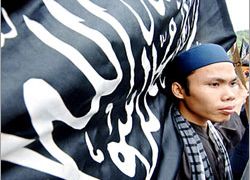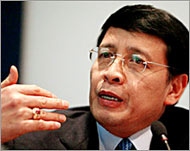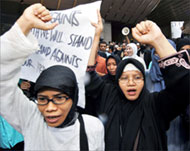Radicals ‘exploiting cartoon backlash’
Indonesian leaders are urging Muslims protesting over cartoons of Prophet Muhammad to stop rallies from spinning out of control.

Speaking after discussing the issue with Hassan Wirajuda, the foreign minister, religious leaders did not call for an end to protests, but said violence would be used to paint a negative picture of Indonesia.
Indonesian protesters have vandalised a tower block in Jakarta housing the Danish embassy and its consulate in another city, which prompted Copenhagen on Tuesday to urge its citizens to leave the country. Denmark’s flag has also been burnt in numerous cities.
Din Syamsuddin, a religious leader, said: “The reaction has been sufficient … in getting the message across.
He leads the Muhammadiyah, Indonesia’s second-largest Muslim group with 30 million adherents, and is a member of the Indonesian Council of Ulemas (MUI), the highest authority on Islam in the country.
“All Muslims feel that their hearts have been wounded, because this matter is really contempt against the Prophet Muhammad who is loved by all Muslims,” he said.
Regret
 |
|
Indonesian FM Wirajuda said |
“But do not go overboard and get trapped into a situation that can be used by elements bent on painting an image of Indonesia’s Islam as an intolerant, rigid and anarchic society.”
|
|
Syamsuddin said the Danish envoy to Indonesia had called him to express regret over the situation and had urged Indonesia’s Muslims to accept such apologies.
But Syamsuddin said that continued negative portrayals of Islam could stoke tensions that might prove there was a clash of civilisations between Islam and the West.
“If this happens again and the West still doesn’t understand Islam, I think this will spark Islamic radicalism,” he said.
“I personally call on Muslims in Indonesia not to react excessively, let alone getting trapped into anarchy, because this is something which is very much against Islam.”
Wirajuda, the foreign minister, said uncontrolled protests could “give more ammunition to radical groups” to heighten tensions. He did not elaborate.
“The cartoons have hurt the Islamic community, so it has added to ammunition for radical groups to exploit the situation and the whole thing has got out of proportion,” he said.
Editors questioned
 |
|
Protesters at the Danish |
Meanwhile, police say they are questioning two editors at an Indonesian news magazine that reprinted several of the drawings to accompany a report on the uproar.
Detective Suwondo Nainggolan said two editors at Peta magazine, which has a circulation of 3000, were being questioned on Wednesday.
The magazine is based in Bekasi, a town on the eastern outskirts of Jakarta.
“We are still in the process of determining whether or not publishing the cartoons is a crime,” he said.
Apologies
Abdul Wahad Abdi, Peta’s chief editor, has apologised for the decision to run the cartoons, The Jakarta Post reported.
The paper quoted Abdi as saying: “No maliciousness was intended. We never intended to insult or disgrace Islam.”
|
“No maliciousness was intended. We never intended to insult or disgrace Islam” Abdul Wahad Abdi, |
The cartoons, which first appeared in a Danish newspaper in September but have since been reprinted elsewhere, have triggered protests throughout the Muslim world, including in Indonesia.
One of the drawings shows Prophet Muhammad wearing a turban shaped as a bomb. Another portrays him holding a sword, his eyes covered by a black rectangle.
Islam prohibits any depiction of the prophets to prevent idolatry.
Some newspapers said they reprinted the cartoons to illustrate stories about the controversy, while others said they did so to support the principle of free speech.
Indonesia, the world’s most populous Muslim nation, has condemned the drawings.